| Welcome to the LOUDEST DOT COM ON THE PLANET! | |
 |

|
| Welcome to the LOUDEST DOT COM ON THE PLANET! | |
 |

|
An Interview With 3rd Strike Vocalist Jim Korthe By Irena Kurpiel, Contributor Thursday, April 25, 2002 @ 4:05 PM
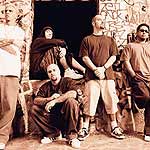 KNAC.COM: Where did the music start?
KNAC.COM: Where did the music start? JIM: Well Todd the guitarist and I formed a band in 1988 called Dimestore Hoods, which was pretty much a rap band, kinda like what we’re doing now with rap and melody going on together. We wrote songs ‘til about 1990 and we got signed in 1995 on MCA and released a record in ’96. The label ended up calling us off the road and telling us to write another record, so we told them we wanted to get off the label and they had to pay us off. We had a few line up changes of that band after that until we decided to change the name and formed 3rd Strike. I met the guitarist Erik and the bass player Gabe because my friend was head of the Sober Living Home that they were in. My friend brought Erik over and he played some acoustic classical piece for me and I was blown away by it. I said, “Whoa, that’s great! Do you play heavy music?” and he said “No problem.” He played some original riffs for me and I said, “You’re in!” I found our drummer through a mutual friend and we got together and started writing from the very first time we all played together.” KNAC.COM: So where does the name 3rd Strike come in? JIM: This has to do with the ‘three strikes you’re out’ felony law. Three felonies mean life in prison. I used to run with a gang here in LA from about ’88 to ’95 and a lot of my friends are down on their third strike doing a lot of time for it. I have seen a lot of people going down for their third strike for like smoking a cigarette in county jail, that’s a felony… that’s why we named the band that. 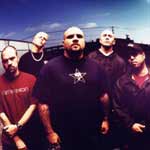 KNAC.COM: Tell us about the impact that gang life had on you and why you joined up in the first place?
KNAC.COM: Tell us about the impact that gang life had on you and why you joined up in the first place? JIM: I first joined the gang because I was looking for a father figure. My father wasn’t there. I was looking for a male role model. I was raised by my three sisters and my mother. My dad was in Vietnam, he came back when I was about 9 and he was all screwed up. He didn’t have much time for me. So, I found that brotherhood in the gang. I learned a lot from the experience. I got real streetwise I mean the good thing was the brotherhood, the bad thing was losing and burying five of my friends one summer in 1990. That, plus the senseless loss of life… I, myself, doing time in jail… It just got to the point one year where it was like I needed to choose whether I was going to go to prison or die Instead I decided I wanted to take the positive route out. I wanted to share my experiences of my life and be able to tell stories that could maybe reach some kids and have some people feel some emotion when they listen to my songs, ‘cause they’re all real stories and real experiences. KNAC.COM: What’s the most valuable lesson learned from it all that you could share? JIM: That love is the most important thing in life. Family, friends… And that violence is so senseless. A lot of people like to glamorize violence in songs. I believe that those are the people that never lived through violence ‘cause once you do live through it and see your friend die in front of you and get caught up in that life, you know damn well that you will never glorify violence. KNAC.COM: Is this something that you just came to realize after stepping out or did you feel the same emotion out on the street? JIM: Oh, no, I felt it while I was in the gang. I didn’t want to live while I was in there, I wanted to die every day that I woke up. I never wanted to kill myself but I was prepared to die by the time I was 25. KNAC.COM: I’ve heard so many stories about gangs where once you are in, you are in. How did you get out?
I have given them hope, I think. I have shown them that you can actually follow a dream and if you work hard enough you can attain it. I think that all of us in the gang grew up and saw it for what it was. We saw the senselessness of it all. KNAC.COM: So your lyrics share this message? JIM: Well, a lot of people say, “What’s the message that you want to portray” and really it’s not one message, because every day that I sit down and write, I am in a different mood. Some of my songs deal with hope, some deal with loss and sadness, some songs are angry. There is a song called “Breathe It Out” which talks about the realities of gang life, it’s done in kind of a rap. Then we have a song called “Strung Out” which talks about my drug addiction growing up and getting through it. “Cities on Fire” talks about police violence, police brutality and growing up in Los Angeles. Most of my lyrics on Lost Angel have to do with growing up in LA and being affected by everything in my environment. I can’t put a song out that I don’t feel means anything, like a party song. I like to come up with stuff that really means something to me, something I have lived through. You can pretty much tell with the record. KNAC.COM: Is this honest form of lyric writing therapeutic for you? JIM: Definitely! I mean we have a song called “Walked Away” which is about my father pretty much abandoning me and coming back into my life when I am a grown man. It’s like, “I am a grown man now, I don’t need you, I walked away.” In writing that song, it definitely let me vent and be able to say what I needed to say. Now my father and I don’t have that bad of a relationship anymore.” KNAC.COM: In listening to Lost Angel, I can get lost in the musical diversity of it all. You have the rap, the melody, the pounding thrash and the plain old rock and roll. What comes into the writing process? JIM: Well, the thing is, if you ask us what our influences are, everyone has such different, diverse influences. I myself like a lot of old heavy metal, but I am influenced by Motown oldies like Al Green, Marvin Gaye and reggae like Bob Marley. Then I like a lot of hip-hop and rap… I remember when I first heard this band called the BooYa Tribe, well I heard them in 1987. That’s when I got together with Todd and I said, “I want to do this.” They had melody, they had rap and they had a band backing them, and that was the first band I had ever seen do that. I wanted to do the same thing, but use a heavy guitar also. A lot of my melodies are R&B and soul… this has a lot to do with my influences as far as writing music, and I think that’s what sets us apart from other bands. We’re not afraid to get things pretty or be vulnerable lyrically. We just try different things. KNAC.COM: How did Hollywood records get involved? JIM: Actually we were recording a demo in this studio owned by Fletcher, the guitarist from Pennywise. He came in and heard the song “No Life,” and saw me and Todd and remembered us from Dimestore Hoods. We had started back when Pennywise started. He said, “You guys have been doing this a long time. This song is great, I can hear it on the radio. I am gonna help you guys out.” And the next day he gave it to his manager Stuart, who became our manager. He came to our studio, sat down with us and talked about trying to get us signed. A couple of weeks later we had a showcase for about five labels set up at The Whiskey, and then Hollywood records called us. They wanted to beat everyone to the punch. They wanted to come and see a rehearsal. So they came down and they really, really got it! A couple of songs into our rehearsal, they wanted to sign us. We really signed with them because they were very passionate about us and they needed a band like us ‘cause their history with rock bands is not very big. We knew we would be a priority in 2002 and we knew that was the right label. 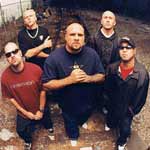 KNAC.COM: How was it working with Mudrock at the helm?
KNAC.COM: How was it working with Mudrock at the helm? JIM: Oh, he was very, very essential in the pre-production stage. He came in and we had like five-minute songs, he trimmed the fat off a lot of them. At first we were like, “Man, why would we want to do that?” But then sitting back and listening to it after a couple of days when it was put into pro tools and cut up… He came up with some really good ideas. He’s a very good producer and he did wonders with my vocals on the record. KNAC.COM: How was Toby Wright involved? JIM: Actually, Toby wanted to do the record and we wanted him to do the record, but there were timing conflicts where he had a band that he was working with and we couldn’t wait, so we went with Mudrock. Then, we were approached by the label to do the song “Paranoid” for the Ultimate X soundtrack. We went in to record that with Toby. It came out really good. In the end, they ended up using the original “Paranoid” for the soundtrack, but the song came out so good and we really loved it so we ended up putting it out on the record. KNAC.COM: The version of “Paranoid” you guys did sounds brilliant! How long did you have to work on it? JIM: We had a couple of days to put that together. I really wanted to keep it true to form; I wasn’t into butchering a Sabbath song since I hold it so high. Then the label talked about putting a rap in the middle, and I am like “Oh, I can’t do that to a Sabbath song.” But then we got in the studio and DJ Muggs (Cypress Hill) came in and started cutting on it, and I was like “Well shit, if he’s cutting on it I ‘have’ to write something.” So, I extended the middle section and put some lyrics together in ten minutes and it really came out good. It was just one of those things that happens in the studio… A magic moment. KNAC.COM: Since the album has been out for a while now and you have had the time to settle into the overall production, is it the perfect album, or is there anything you wish you could change? JIM: Oh, I think no matter what, no matter how, the album comes out, I’ve always got things I would like to change about it. There are certain things that I would like to have sound better. Maybe a little heavier…? I made a lot of changes on the record. I rewrote melodies and lyrics. We were really prepared to go into the studio, take these songs, bounce them off Mudrock and off our people and try to make the best of our songs… it was not like we were married to them. I have had a record come out before and I was unhappy with it, but even though we recorded this record last summer, I am still into it. The one thing we sat down and talked about long ago, was that we wanted to take the listener on a journey, we didn’t want to take one song and write it twelve times. I get bored with albums like that. We wanted a journey of up and down through the whole record and I think we achieved that. KNAC.COM: Which song on the album best represents the band? 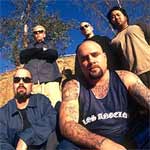 JIM: I think it’s “No Life” because it shows the sensitive and vulnerable side. It has a pretty side, and then the verses and choruses really rock. It has melody while we are hard rapping. I never thought it would get any airplay but [an LA station] has picked it up and a bunch of other stations have picked it up already.
KNAC.COM: What’s next for the band?
JIM: I think it’s “No Life” because it shows the sensitive and vulnerable side. It has a pretty side, and then the verses and choruses really rock. It has melody while we are hard rapping. I never thought it would get any airplay but [an LA station] has picked it up and a bunch of other stations have picked it up already.
KNAC.COM: What’s next for the band? JIM: We leave to tour Europe for a couple of weeks. We just want to tour constantly. I don’t even want to be home. I want to work, work, work and have as many people hear our music as possible. I just really want to reach people with our music.
| |||||||
|
|
| Recent Features |
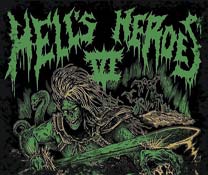 |